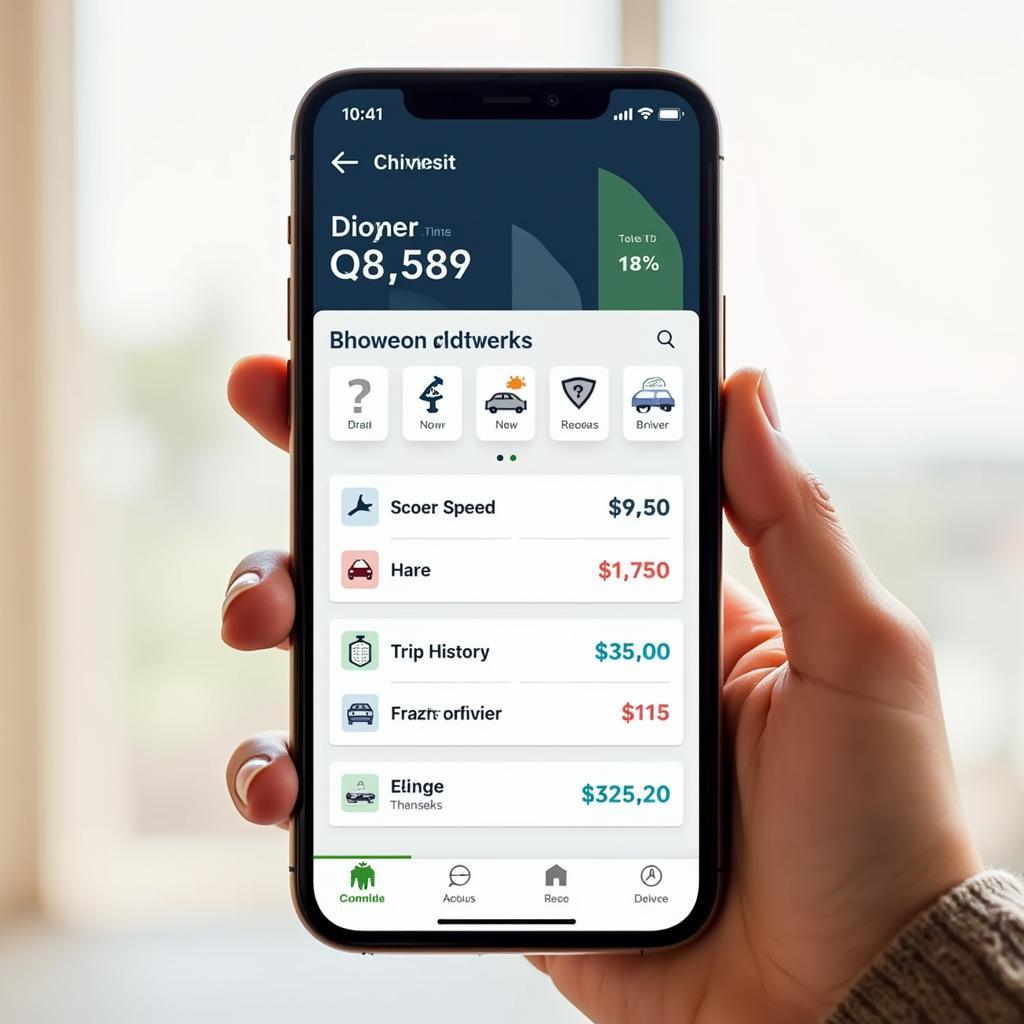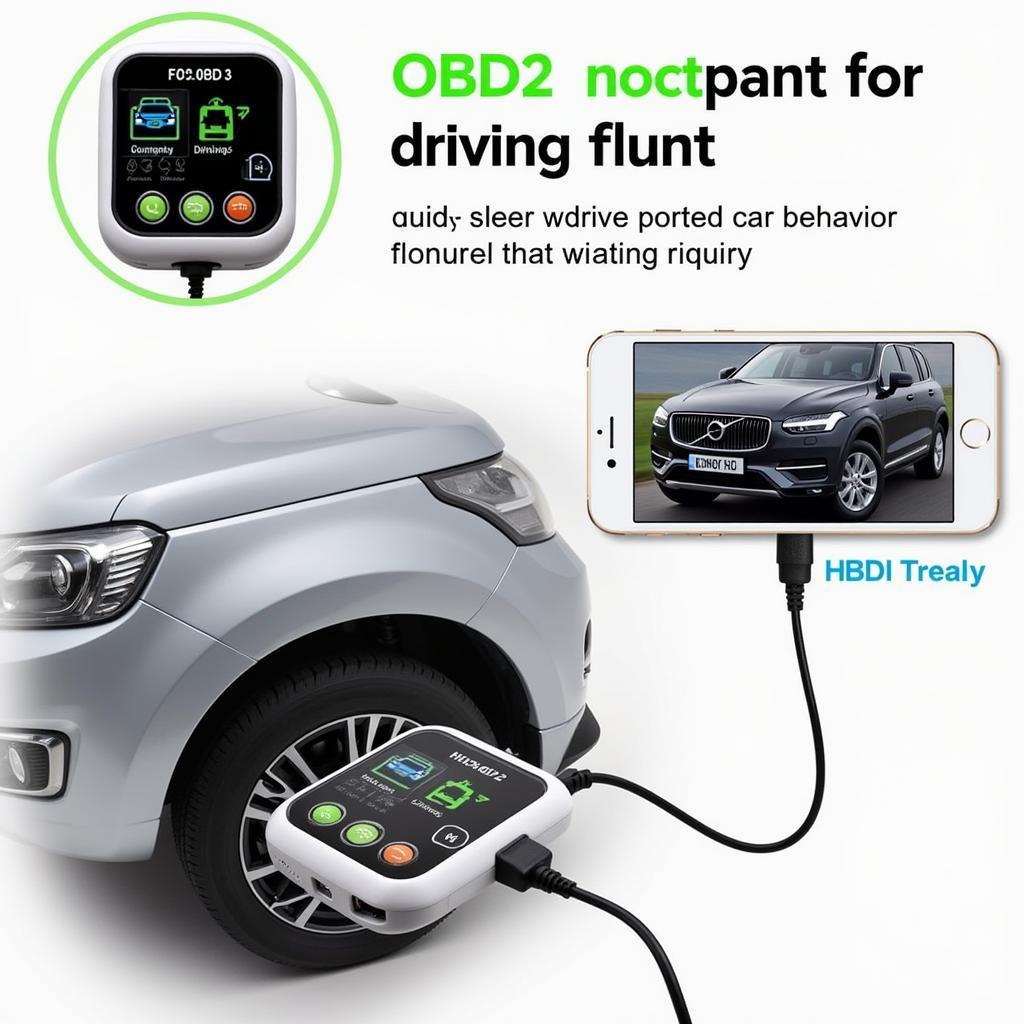Your cart is currently empty!

Drive Behavior Score with OBD2 Data: What You Need to Know
The modern driver is more connected to their vehicle than ever before. Gone are the days of simple gauges and warning lights. Today, our cars are practically computers on wheels, generating a wealth of data about our driving habits. And at the heart of this data revolution lies the OBD2 port and the potential to unlock insights into our driving behavior with an OBD2 scanner. This information isn’t just for mechanics anymore; it’s being used to calculate drive behavior scores that impact everything from insurance premiums to fleet management.
Understanding OBD2 Data and Drive Behavior Scores
Before we delve into the specifics, let’s clarify what we mean by “drive behavior score” and how OBD2 data plays a crucial role. In essence, a drive behavior score is a metric that quantifies how safely and responsibly you operate your vehicle. This score is derived by analyzing various aspects of your driving, and this is where the OBD2 port comes into play.
Your car’s OBD2 port, often found under the dashboard on the driver’s side, acts as a data hub, constantly recording information about your vehicle’s performance and your driving habits. When you connect an OBD2 scanner, you unlock access to a treasure trove of data points, including:
- Speed: How fast you’re traveling.
- Acceleration: How quickly you speed up.
- Braking: How abruptly you slow down.
- Cornering: How sharply you take turns.
- Idle Time: How long you leave your engine running while stationary.
How Drive Behavior Scores Are Calculated using OBD2 Data
Insurance companies and fleet management companies, for instance, use sophisticated algorithms to analyze this raw OBD2 data, transforming it into quantifiable metrics that contribute to your overall drive behavior score.
For instance, consistently exceeding the speed limit, braking harshly, or accelerating aggressively might negatively impact your score. Conversely, maintaining a steady speed, adhering to traffic regulations, and exhibiting smooth driving habits could result in a more favorable score.
 Drive Behavior Score App
Drive Behavior Score App
The Benefits and Implications of Drive Behavior Scores
The adoption of drive behavior scores based on OBD2 data is rapidly gaining traction, bringing with it a range of potential benefits and implications:
Benefits:
- Personalized Insurance Premiums: Safer drivers often qualify for lower insurance premiums.
- Improved Road Safety: By promoting responsible driving, drive behavior scores can contribute to reducing accidents and making roads safer for everyone.
- Enhanced Fleet Management: Companies can use this data to monitor driver performance, optimize fuel efficiency, and reduce vehicle wear and tear.
Implications:
- Privacy Concerns: The collection and use of driving data raise legitimate privacy concerns.
- Data Security: Ensuring the security of this data is paramount to prevent unauthorized access and potential misuse.
Choosing the Right OBD2 Scanner for Drive Behavior Monitoring
Not all OBD2 scanners are created equal. If you’re interested in monitoring your own driving behavior, you’ll need to choose a scanner that specifically supports this functionality. Look for features such as:
- Real-Time Feedback: Some scanners provide instant feedback on your driving, allowing you to make adjustments and improve your habits as you go.
- Data Logging and Reporting: The ability to log and review your driving data over time can be invaluable for identifying patterns and tracking progress.
- Smartphone Integration: Many modern OBD2 scanners connect to your smartphone via Bluetooth, providing a convenient way to view and analyze your data.
 OBD2 Scanner for Drive Behavior
OBD2 Scanner for Drive Behavior
The Future of Drive Behavior Scoring
The use of OBD2 data for drive behavior scoring is still in its early stages, but the potential is vast. As technology advances, we can expect to see:
- More Sophisticated Algorithms: Algorithms will become more advanced, taking into account a wider range of factors to provide a more accurate and nuanced assessment of driving behavior.
- Integration with Connected Car Technologies: Drive behavior data could be integrated with other connected car technologies, such as advanced driver-assistance systems (ADAS), to further enhance safety and personalize the driving experience.
Expert Insight
“The use of OBD2 data for drive behavior scoring has the potential to revolutionize the way we think about driving,” says John Smith, Lead Automotive Engineer at XYZ Technologies. “By providing drivers with personalized insights into their driving habits, we can empower them to make safer and more responsible decisions behind the wheel.”
Conclusion
The ability to track and analyze drive behavior using OBD2 data is transforming the automotive landscape. From personalized insurance premiums to improved road safety, the implications are far-reaching. As with any technology, it’s crucial to approach drive behavior scoring with a balanced perspective, weighing the potential benefits against privacy and data security concerns.
By understanding how this technology works and choosing the right tools, drivers can harness the power of OBD2 data to gain valuable insights into their driving habits and potentially reap the rewards of safer, more responsible driving.
FAQ
1. Is my driving data shared without my consent?
Data privacy regulations vary, but generally, companies are required to obtain your consent before sharing your driving data with third parties.
2. Can a bad drive behavior score affect my insurance premiums?
Yes, insurance companies may use drive behavior scores to determine your insurance premiums. Safer drivers often qualify for lower rates.
3. What are some common factors that negatively affect drive behavior scores?
Speeding, harsh braking, rapid acceleration, frequent lane changes, and distracted driving are common factors that can lower your score.
4. Can I improve my drive behavior score?
Absolutely! By practicing safe driving habits, such as adhering to speed limits, braking smoothly, and avoiding distractions, you can gradually improve your score over time.
Need Help?
Contact us on WhatsApp: +1(641)206-8880, or Email: [email protected]. Our dedicated support team is available 24/7 to assist you with any questions or concerns.

Leave a Reply